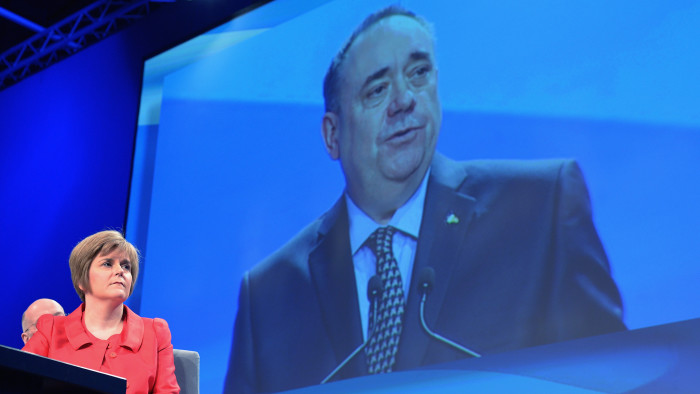Sturgeon hails ‘momentum’ behind Scotland’s ‘Yes’ campaign

Roula Khalaf, Editor of the FT, selects her favourite stories in this weekly newsletter.
The deputy leader of the Scottish nationalists said the campaign for independence had “extraordinary momentum” in a live television debate on Tuesday night, while senior figures from the Labour and Conservative parties pledged that Scots did not have to split from the UK to gain more powers.
In a less testy debate than the recent clashes between Alex Salmond and Alistair Darling, Nicola Sturgeon used the boost from the Yes campaign’s recent gain in the polls to turn the tables on Douglas Alexander, Labour politician and shadow foreign secretary, on the crucial issue of which currency an independent Scotland would use.
“If, as the polls are suggesting we might, Scotland votes yes, what option would you back?” Ms Sturgeon asked Mr Alexander with a smile.
Mr Alexander said a currency union with the rest of the UK – the Scottish government’s preferred option – would be “bad for Scotland” because it would mean “less powers, not more powers here in Scotland”.
The currency question was complicated further on Tuesday evening when Danny Alexander, chief secretary to the UK Treasury, used a speech in London to say an independent Scotland could not rejoin the EU if it adopted sterling informally.
Mr Alexander released a letter he had received from Olli Rehn, until recently the European Commissioner for Economic and Monetary Affairs, which said “sterlingisation” would “simply not be possible, since that would obviously imply a situation where the candidate country concerned would not have a monetary authority of its own and thus no necessary instruments of the Economic and Monetary Union”.
Tuesday’s television debate came after a poll for the Sun newspaper showed a sudden decline in the No camp’s lead as the campaign enters its final weeks.
Douglas Alexander was joined in the debate by the unlikely ally of Ruth Davidson, leader of the Scottish Conservative party.
Ms Davidson raised eyebrows at one point by quipping that it was unlikely – based on the polls – that the Conservative party would win the next UK general election. She made the comment in answer to a question about the Conservatives’ promise to hold an “in-out” referendum on EU membership – an unpopular idea in the relatively pro-EU Scotland.
Both Ms Davidson and Mr Alexander said repeatedly that Scotland could gain more powers from Westminster without splitting from the UK.
“I believe we really can have what I sense most people here want – more powers without losing the strength, security, stability of the UK,” said Mr Alexander.
Labour, the Conservatives and the Liberal Democrats have all promised further devolution to Scotland if it votes No but Ms Sturgeon warned voters not to take their word for it.
“If you want more powers . . . there’s only way to get that, and that’s put your cross in the Yes box,” she said.
Perhaps the biggest cheer of the night was for the closing statement from Patrick Harvie MSP, co-convener of the Green Party, who joined Ms Sturgeon on the Yes side of the debate.
“I’m not a nationalist, I’m not driven by feelings of Britishness or Scottishness,” he said. “I feel a bit of both and I probably still will when Scotland is independent.” But, he said, “Let’s look at the country around us and decide it’s not good enough – we deserve better and Scotland is capable of better. We’re ready now – let’s vote yes.”
Comments